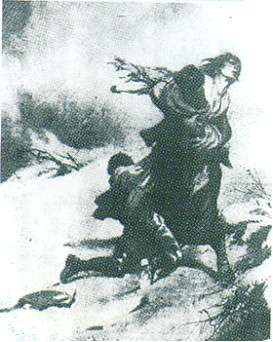The Story of Carmela Borelli translation by Mimi Torchia Boothby
 In the year 1929, the history of our town was enriched by an extremely dramatic event that marked our history with an act of love by a heroic woman. It was the story of a mother, Carmela Borelli that made Sersale famous, tying it to an incredible event which demonstrated the strength of maternal feeling. The tragic day for Carmela Borelli was February 21, 1929 when in a moment the winter made its presence felt even though it had seemed that spring was in the air. Like most women in those times, Carmela dedicated herself to farm labor without being able to avoid exposing her children to it, from the time that they were tiny. Almost all year long she stayed at the marina near Murtelliettu together with her youngest children, to procure the grain she needed to make her daily bread. Her husband left her alone often because he was a shepherd and had to follow his flocks around the countryside. That day she decided to leave in the late morning with two donkeys loaded with grain; and planned to reach the town where she would make the bread. The donkeys were also carrying some fine fabric that she had jealously conserved for a tailor who would then make her a new little gown. She had with her her two youngest children, Costanza, nine years old, and Francesco, five. The weather seemed calm and the sky was blue, the morning seemed rather propitious for a voyage. She had gone along a few kilometers on that mule trail with her children when the sky suddenly began to darken and a bitter wind from the montains carried with it a few flakes of snow. Mamma Carmela picked up her speed, but the situation deteriorated: the wind became stronger and stronger, the snow fell with intensity, a terrible tempest surrounded the mother and children. The children, numbed by the cold walked slowly and with difficulty; scarcely protected by their miserable ragged clothing from the gusts of wind. Soon they were no longer able to walk. The desperate mother picked one of them up and continued the march. Soon, the donkeys were no longer able to keep up the pace and one of them collapsed near the place called "i tre cavunielli" and died from the cold there. The loss of the donkey and its precious load added to Carmela Borelli's desperation, but there was no time to lose, she valued her own life and the lives of her children above everything else. A farmer, Felice Torchia who was walking down the same road exhorted her to walk faster and abandon the other donkey, but she didn't hear him, she was so enervated. With her remaining energy, she tried to cross the last stretch of road before the outskirts of town. The children were not able to resist the cold any longer and suffering from exposure, they started to show the first signs of frostbite. The mother tried to do the impossible, she took off most of her clothing and lovingly covered her children with them. Nearly naked, her misadventure continued with little Francesco in her arms almost to the first houses at the foot of Monte Crozze where she was no longer able to walk and collapsed onto the ground. In front of the church was the "Conicella dei Zanchi", a tabernacle which displayed an image of the Virgin Mary. Aware that she had almost exhausted her own life, she looked for shelter for her children. She looked around but was not able to alert anyone to help her because they couldn't hear her weakened voce. Her final act was to cover her children for protection with her own semi-nude body. Felice Torchia, arriving at about the same time into town, knocked on the first doors he reached, and asked the neighbors to run to get help for the woman. Quickly, some people ran to help her and they found her almost dead and the children shivering and cold, but safe by the grace of her sacrifice. The townspeople carried the mother and children quickly to safety and someone ran to get the doctor, but when he arrived upon the scene where they had sheltered Carmela, he was told that his presence unfortunately was no longer necessary. This heroic act will always be appreciated and remembered, so much that the Illustrated Tribune and the Illustrated Morning paper dedicated the cover of their March first 1929 issue to her and the "Little Italian" offered a monument in white marble that still stands in the center of the piazza in Sersale entitled "Carmela Borelli". Every year, to remember this heroic mother, Carmela Borelli, the Pro-Loco society of Sersale issues an award to a Calabrese woman who distinguishes herself as a wonderful woman and mother. |